The NASA Electronic Parts and Packaging (NEPP) '02 Workshop
The NASA Electronic Parts and Packaging (NEPP) '02 Workshop
The NASA Electronic Parts and Packaging (NEPP) '02 Workshop
Create successful ePaper yourself
Turn your PDF publications into a flip-book with our unique Google optimized e-Paper software.
Abstracts ________________________<br />
Session 10 – Radiation Effects on Technology<br />
Radiation testing of the IEEE 1394 FireWire<br />
Stephen Buchner, GSFC<br />
Abstract<br />
Proton <strong>and</strong> heavy-ion testing were done on IEEE 1394 serial buses<br />
from two different manufacturers. <strong>The</strong> response of the IEEE 1394<br />
to single-event upsets was very complicated <strong>and</strong> a method was<br />
devised to categorize the different kinds of failures according to<br />
what steps were required to restart communications. <strong>The</strong>re were<br />
both soft errors that were detected but did not cause disruption of<br />
communications, as well as hard errors that required software or<br />
hardware reboots. Fourteen different kinds of hard errors were<br />
observed. As configured for testing, the parts would have serious<br />
reliability problems if operated in space.<br />
Speaker Biography<br />
Stephen Buchner has been a QSS employee assigned to the<br />
MEDS program at <strong>NASA</strong>/GSFC since October 2001. His area of<br />
interest is in radiation effects in microelectronic <strong>and</strong> photonic<br />
circuits. He has been active in the field of radiation effects for<br />
fifteen years <strong>and</strong> has published numerous papers in refereed<br />
journals. He previous worked in the same area as a contractor at<br />
the Naval Research Laboratory in Washington DC. Prior to 1983,<br />
Stephen Buchner was employed by Martin Marietta Laboratory as<br />
a scientist in the areas of infrared detectors <strong>and</strong> radiation effects.<br />
He has a BA degree from Princeton University <strong>and</strong> a PhD from <strong>The</strong><br />
University of Pennsylvania.<br />
Recent Proton Test Results on Fiber Optic Links<br />
Ken LaBel, GSFC<br />
Abstract<br />
Because there is no st<strong>and</strong>ard set of testing procedures for proton<br />
testing, we have put together a document of “Lessons Learned”<br />
from many man-years of experience doing proton testing. <strong>The</strong><br />
document contains the following information: a brief description of<br />
the environment, a list of facilities, dosimetry, general<br />
considerations when doing proton testing <strong>and</strong> specific<br />
considerations for doing single-event testing, total ionizing dose<br />
testing <strong>and</strong> displacement damage testing. <strong>The</strong> final chapter in the<br />
document describes combined effects such as the limitations<br />
imposed by total ionizing dose on single event effects testing.<br />
Speaker Biography<br />
Ken LaBel graduated the John Hopkins University in 1983 with a<br />
BES in EECS with a minor in mathematical sciences. He has been<br />
at <strong>NASA</strong> since he graduated in roles as diverse as ground <strong>and</strong><br />
flight hardware designs, systems engineering, robotics, <strong>and</strong> now<br />
radiation effects for the last decade. Mr. LaBel is an active member<br />
of the community <strong>and</strong> has published over 75 papers. He is<br />
currently:<br />
- Group leader of <strong>NASA</strong>/GSFC's radiation effects group,<br />
- Project manager of the <strong>Electronic</strong>s Radiation Characterization<br />
project, <strong>and</strong><br />
- Deputy project manager for <strong>NASA</strong>'s Living With a Star Space<br />
Environment Test bed<br />
29<br />
Radiation Results on Advanced High-Density Memories<br />
Allan Johnston, JPL<br />
Abstract not available at time of printing<br />
First Total Ionizing Dose Results on a Commercial Micromirror<br />
Allan Johnston, JPL<br />
Abstract not available at time of printing



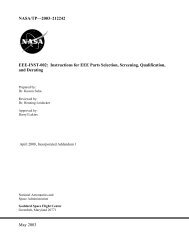
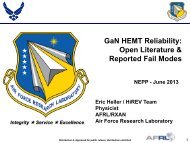
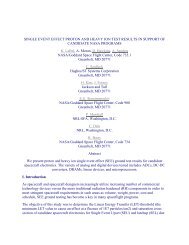
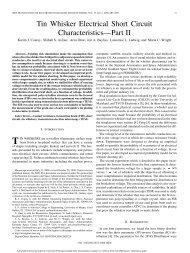
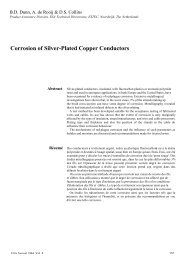
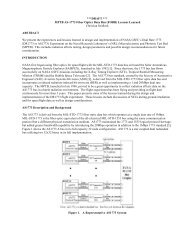
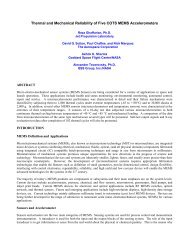
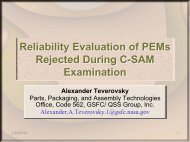
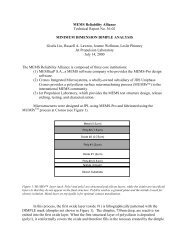
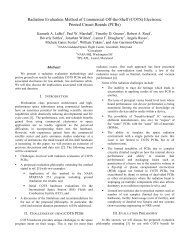
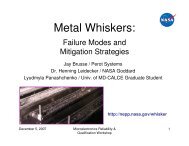
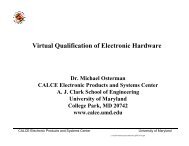
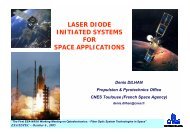
![mil-std-2223 [test methods for insulated electric wire] - NEPP](https://img.yumpu.com/4036001/1/190x249/mil-std-2223-test-methods-for-insulated-electric-wire-nepp.jpg?quality=85)